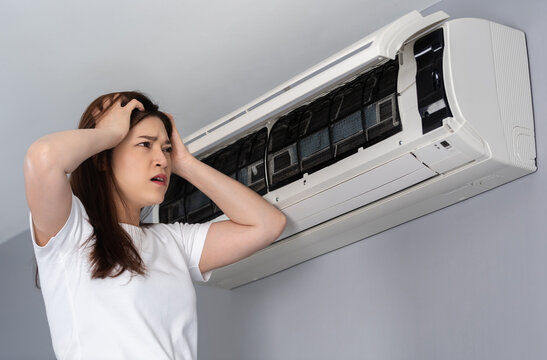When the sweltering heat of summer hits, the last thing anyone wants is for their air conditioning (AC) unit to break down. Unfortunately, breaking AC is a common issue that many homeowners face. Understanding the causes, solutions, and preventive measures can save you from the discomfort of a hot home and the potential costs of repairs. In this article, we will delve into the intricacies of breaking AC units, exploring everything from the signs of failure to the best practices for maintenance.
The Anatomy of an AC Unit
To truly grasp the concept of breaking AC, it’s essential to understand how an air conditioning unit operates. An AC unit is designed to cool indoor air by removing heat and humidity. The process involves several key components: the compressor, condenser, evaporator, and expansion valve. Each part plays a crucial role in ensuring that your home remains a comfortable temperature.
The compressor is often referred to as the heart of the AC system. It pumps refrigerant through the system, allowing heat to be absorbed from the indoor air and expelled outside. The condenser, located outside the home, releases the heat absorbed by the refrigerant. Meanwhile, the evaporator, typically found inside, cools the air that circulates through your home. The expansion valve regulates the flow of refrigerant, ensuring that the system operates efficiently.
Understanding these components can help homeowners identify potential issues. For instance, if the compressor fails, the entire system can come to a halt, leading to a breaking AC scenario. Recognizing the signs of trouble early can prevent a complete breakdown and save you from costly repairs.
Common Causes of Breaking AC
There are several reasons why an AC unit may break down. One of the most common causes is a lack of maintenance. Just like any other appliance, air conditioners require regular upkeep to function optimally. Neglecting routine maintenance can lead to a buildup of dirt and debris, which can hinder airflow and cause the system to work harder than necessary. This extra strain can ultimately lead to a breaking AC.
Another frequent culprit is refrigerant leaks. Refrigerant is the lifeblood of an AC unit, and if there’s a leak, the system cannot cool the air effectively. Low refrigerant levels can cause the compressor to overheat, leading to a breakdown. Homeowners should be vigilant for signs of refrigerant leaks, such as hissing sounds or ice buildup on the evaporator coils.
Electrical issues can also contribute to a breaking AC. Faulty wiring, blown fuses, or malfunctioning thermostats can disrupt the power supply to the unit, causing it to fail. Regular inspections can help identify these electrical problems before they escalate into a complete breakdown.
Signs Your AC is Breaking Down
Being aware of the signs that your AC is on the verge of breaking down can save you from a sweltering summer. One of the first indicators is unusual noises. If your AC unit starts making strange sounds, such as grinding, squealing, or banging, it’s a clear sign that something is amiss. These noises often indicate mechanical issues that require immediate attention.
Another sign to watch for is inconsistent cooling. If certain rooms in your home are warmer than others, or if the AC struggles to maintain the set temperature, it may be time to call a professional. Inconsistent cooling can be a result of various issues, including blocked ducts, refrigerant leaks, or a failing compressor.
Additionally, if you notice an increase in your energy bills without a corresponding increase in usage, it could be a sign of a breaking AC. An inefficient unit will consume more energy to cool your home, leading to higher costs. Monitoring your energy bills can help you catch potential problems early.
Solutions for a Breaking AC
When faced with a breaking AC, the first step is to diagnose the problem. If you’re comfortable doing so, you can perform a basic inspection of your unit. Check for any visible signs of damage, such as leaks or loose connections. However, if you’re unsure or the problem seems complex, it’s best to call in a professional technician.
One common solution for a breaking AC is to recharge the refrigerant. If a leak is detected, the technician will repair it and then refill the refrigerant to the appropriate levels. This process can restore your AC’s cooling capabilities and prevent further damage to the compressor.
In cases where the compressor has failed, replacement may be necessary. While this can be a costly repair, it’s often more economical than replacing the entire unit, especially if your AC is relatively new. A qualified technician can help you determine the best course of action based on the age and condition of your system.
Preventive Measures to Avoid Breaking AC
Prevention is always better than cure, especially when it comes to your air conditioning system. Regular maintenance is key to keeping your AC running smoothly. Schedule annual inspections with a qualified technician to ensure that all components are functioning correctly. During these inspections, the technician will clean the coils, check refrigerant levels, and inspect electrical connections.
Another preventive measure is to change your air filters regularly. Clogged filters can restrict airflow, causing your AC to work harder and increasing the risk of a breakdown. Depending on usage, filters should be changed every one to three months. Keeping your filters clean can significantly improve your system’s efficiency and longevity.
Additionally, consider investing in a programmable thermostat. These devices allow you to set specific temperatures for different times of the day, reducing the workload on your AC. By optimizing your cooling schedule, you can prevent unnecessary strain on the system and extend its lifespan.
The Importance of Professional Help
While some homeowners may feel confident tackling minor AC issues on their own, it’s essential to recognize when to call in a professional. Complex problems, such as refrigerant leaks or compressor failures, require specialized knowledge and tools. Attempting to fix these issues without proper training can lead to further damage and costly repairs.
Professional technicians have the expertise to diagnose and repair a wide range of AC problems. They can also provide valuable advice on maintenance and energy efficiency, helping you make informed decisions about your cooling system. Investing in professional help can save you time, money, and the discomfort of a breaking AC.
Understanding the Costs of AC Repairs
When faced with a breaking AC, one of the first questions that come to mind is, “How much will this cost?” The answer can vary significantly depending on the nature of the problem. Minor repairs, such as replacing a capacitor or cleaning coils, may only cost a few hundred dollars. However, more extensive repairs, like compressor replacement, can run into the thousands.
It’s essential to get multiple quotes from different technicians to ensure you’re getting a fair price. Additionally, consider the long-term costs of repair versus replacement. If your AC is older and requires frequent repairs, it may be more cost-effective to invest in a new unit rather than continually patching up an aging system.
The Role of Energy Efficiency
In today’s environmentally conscious world, energy efficiency is a significant consideration for homeowners. An inefficient AC unit not only leads to higher energy bills but also contributes to environmental degradation. When your AC is breaking down, it often operates less efficiently, consuming more energy to achieve the same cooling effect.
Investing in an energy-efficient AC unit can save you money in the long run. Look for units with high Seasonal Energy Efficiency Ratio (SEER) ratings, as these models are designed to use less energy while providing optimal cooling. Additionally, consider upgrading to a smart thermostat, which can further enhance your system’s efficiency by optimizing cooling schedules based on your habits.
The Impact of Climate on AC Performance
The climate in which you live can significantly impact your AC unit’s performance and longevity. In hotter regions, air conditioning systems are put under more strain, leading to a higher likelihood of breaking AC scenarios. Understanding your local climate can help you make informed decisions about your cooling system.
For instance, if you live in an area with high humidity, your AC unit will need to work harder to remove moisture from the air. This added strain can lead to more frequent breakdowns. In such cases, investing in a dehumidifier can help alleviate some of the pressure on your AC, improving its efficiency and lifespan.
DIY Maintenance Tips for Homeowners
While professional maintenance is crucial, there are several DIY tasks homeowners can perform to keep their AC units in good shape. One of the simplest tasks is to regularly clean the outdoor condenser unit. Remove any debris, such as leaves or dirt, that may obstruct airflow. This simple step can significantly improve your unit’s efficiency.
Another DIY maintenance tip is to check and clean the drain line. A clogged drain line can lead to water damage and mold growth. Use a wet/dry vacuum to clear any blockages, ensuring that your AC can effectively remove humidity from your home.
Additionally, consider sealing any gaps or leaks in your ductwork. Leaky ducts can lead to significant energy loss, forcing your AC to work harder. Use duct tape or mastic sealant to seal any visible leaks, improving your system’s efficiency and reducing the risk of a breaking AC.
The Future of Air Conditioning Technology
As technology continues to advance, the future of air conditioning looks promising. Innovations in energy efficiency, smart technology, and eco-friendly refrigerants are transforming the industry. For instance, many new AC units are now equipped with smart technology that allows homeowners to control their systems remotely via smartphone apps.
Additionally, the development of eco-friendly refrigerants is helping to reduce the environmental impact of air conditioning. These refrigerants have lower global warming potential and are less harmful to the ozone layer. As regulations around refrigerants become stricter, investing in a modern AC unit that uses these eco-friendly options can be a wise choice for environmentally conscious homeowners.
Conclusion: Staying Cool Amidst Breaking AC
In conclusion, understanding the causes, solutions, and preventive measures related to breaking AC units is essential for every homeowner. By being proactive about maintenance, recognizing the signs of trouble, and knowing when to call in a professional, you can keep your home cool and comfortable, even during the hottest months of the year.
Investing in energy-efficient technology and staying informed about the latest advancements in air conditioning can further enhance your system’s performance and longevity. Remember, a well-maintained AC unit not only keeps you cool but also saves you money in the long run. So, stay cool, stay informed, and don’t let a breaking AC ruin your summer!




